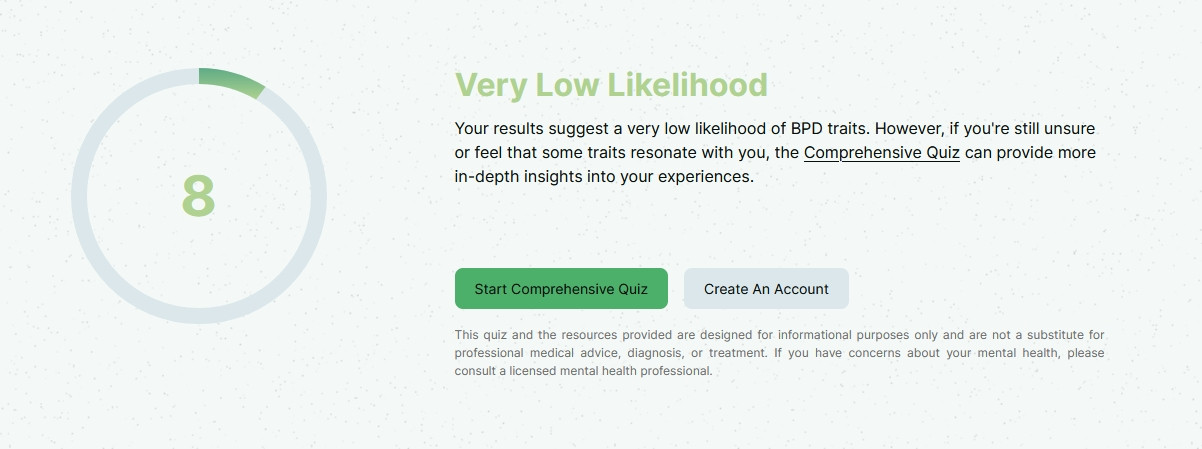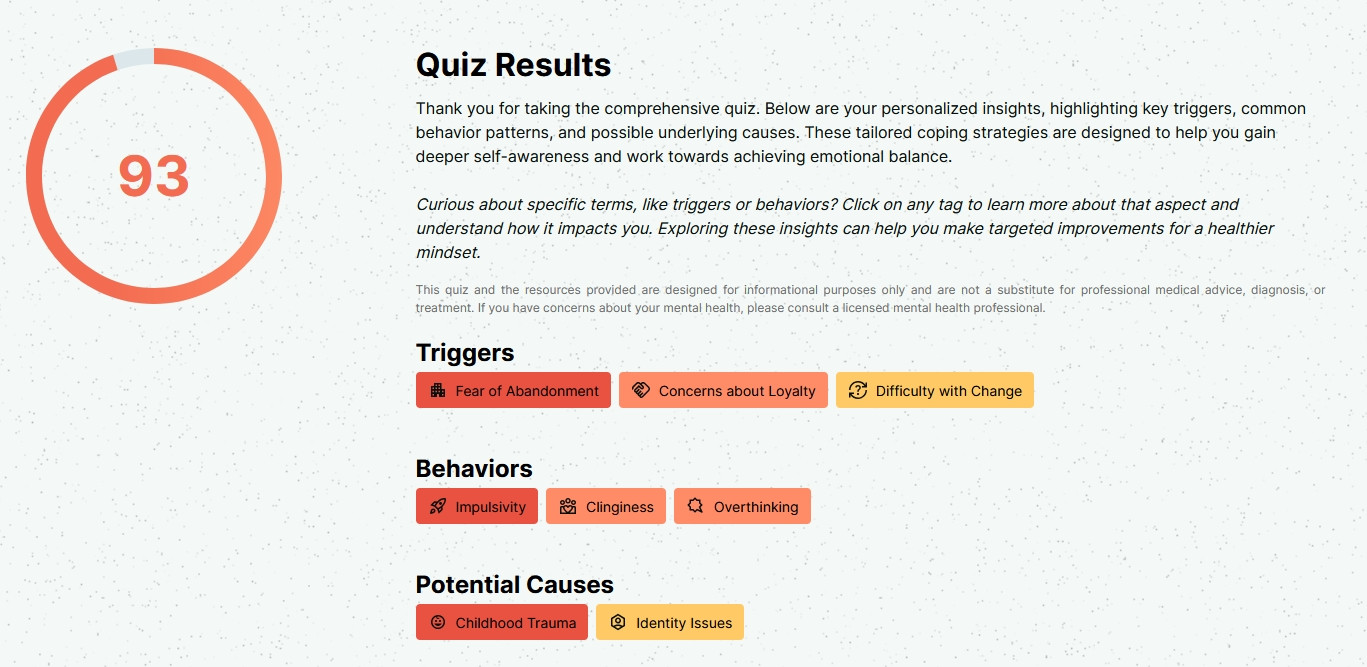Track your moods, reflect with our journal, connect with a supportive community, and take our quiz to learn more about your behaviors and triggers.

Borderline Personality Disorder (BPD) is a mental health condition marked by intense emotional experiences, unstable relationships, and a fluctuating sense of self. People with BPD often experience overwhelming feelings of fear, abandonment, and may struggle with impulsivity and self-image. This can impact their ability to maintain stability in their personal and professional lives.
Living with BPD can be challenging due to frequent emotional turbulence, intense mood swings, and impulsive behavior. These symptoms can lead to difficulties in maintaining healthy relationships, making decisions, and managing self-identity, which can affect overall well-being.
Triggers are events or situations that can intensify emotional responses in individuals with BPD. These triggers often involve feelings of rejection, criticism, or perceived abandonment. Even minor changes in relationships or a disagreement can lead to overwhelming feelings of anger, sadness, or anxiety. Common triggers include conflicts with loved ones, feeling misunderstood, or losing a sense of control in a situation.
BPD often leads to specific patterns of behaviors that are attempts to manage overwhelming emotions. These behaviors may include impulsivity (such as spending sprees or risky actions), intense or unstable relationships, and self-harm or suicidal tendencies. Some individuals with BPD may also engage in behaviors that push others away, such as angry outbursts or manipulative actions, even though they fear abandonment deeply.
The exact causes of BPD are not fully understood, but a combination of genetic, environmental, and social factors likely plays a role. Many people with BPD have experienced childhood trauma, such as abuse, neglect, or abandonment, which may contribute to the development of the disorder. Genetic predisposition and brain structure differences are also being studied as potential contributing factors. In some cases, ongoing exposure to unstable or invalidating environments can exacerbate BPD symptoms.
Living with BPD can feel overwhelming, but there are practical strategies that can help manage the emotional ups and downs. The following tips can guide you toward healthier ways of coping and regaining control over your emotions and relationships:

Our community is built for people with BPD. Find support, track your progress, and reflect on your thoughts. With our tools, you'll feel empowered to manage your BPD journey.
Track your emotional patterns and identify triggers with our intuitive tracker.
Record daily thoughts, identify behavior patterns, and practice CBT techniques to gain control over emotional swings.

Share your thoughts with others who understand your experiences.

85% of people with BPD say that connecting with others who understand their struggles brings a sense of relief and connection. Join our community and start feeling heard and supported.
Take our quiz to learn more about BPD and how it affects you. Whether you're seeking answers or want to identify triggers and behaviors, our quiz can help you get started.
Take our free 10-question quiz to get an initial sense of whether you might be living with Borderline Personality Disorder. It's quick, easy, and designed to help you take the first step toward self-understanding.

For those ready to explore more, our paid quiz goes beyond the basics. With 30 in-depth questions, you'll get: your emotional triggers, your behaviors, possible causes and tips and strategies.

"I was constantly overwhelmed by my emotions, not understanding why I felt so out of control. The mood tracker helped me pinpoint patterns, and the journal allowed me to process my thoughts in a way I never could before. I've finally started feeling like myself again!"
Lily, 22"The full BPD quiz was eye-opening. I finally understood my triggers and behaviors on a deeper level. The personalized tips were spot-on, and I'm now more equipped to handle stressful situations."
Emily, 29"The Comprehensive BPD quiz gave me clarity I didn't know I needed. It highlighted patterns in my triggers and behaviors that I hadn't connected before. The personalized tips feel genuinely helpful, and I'm already applying them to improve my daily life."
Mark, 34"Using the CBT journal has helped me get ahead of my emotional outbursts. Writing down my thoughts every day has given me so much clarity and control over my reactions. It's become an essential part of my routine!"
Jordan, 27We are a team of individuals who understand the challenges of living with BPD because we've been there. Our mission is to provide a supportive space for you to connect, share your thoughts, and find relief. We believe that with the right tools and community, BPD can become a manageable part of life.

Please select a reason for reporting this user. Ensure the reason aligns with the behavior observed.